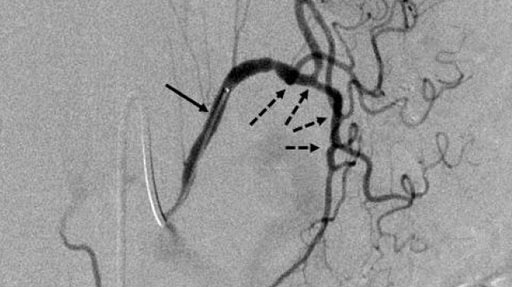Study Indicates Bariatric Embolization is Safe for Morbidly Obese Individuals
By MedImaging International staff writers
Posted on 16 Feb 2017
Bariatric embolization, a novel interventional radiology technique that helps patients lose weight, has been found to be safe and well tolerated by morbidly obese individuals.Posted on 16 Feb 2017
The new procedure reduces the production of the hormone ghrelin in the stomach, and was found to result in an average weight loss of 5.9% in one month, and 9.0% in three months.

Image: A left gastric artery angiography (black arrow) showing fundus of stomach (dashed arrows) (Photo courtesy of RSNA).
The researchers from the Johns Hopkins University School of Medicine published the results of their study in the February 2017, online edition of the journal Radiology. The current phase of the study included the results of the treatment of four female and one male patient, all morbidly obese and with a mean Body Mass Index (BMI) of 43.8. The procedure consisted of embolization of the patients' left gastric artery with 300- to 500-micrometer beads, using fluoroscopic guidance.
The results showed that serum ghrelin hormone levels in the patients dropped on average by 17.5%, at three months, and also resulted in an improvement in quality-of-life parameters without major adverse events for the study group. The researchers noted that bariatric embolization is not intended as a first-line treatment for obesity, nor is it intended to replace bariatric surgery.
Lead author of the study, Clifford R. Weiss, MD at Johns Hopkins University School of Medicine, said, “A number of research papers in the 1990s found signs of hormonal changes after bariatric surgery. In particular, there was a pretty rapid reduction in ghrelin, the most potent hunger-stimulating hormone we know. The hormone is produced in an area of the stomach called the fundus, which is fed primarily by the left gastric artery. These are very promising and exciting results. I think this paper and the additional data we’re compiling show that bariatric embolization is very well tolerated by patients, and there are signs that it could have medium- and long-term efficacy for weight loss. Obesity is a complicated disease that takes many different therapies to treat, including psychological counseling, diet, medication and, in extreme cases, surgery. If we can provide one more piece to the armamentarium, that would be an exciting next step in the treatment of obese patients.”














